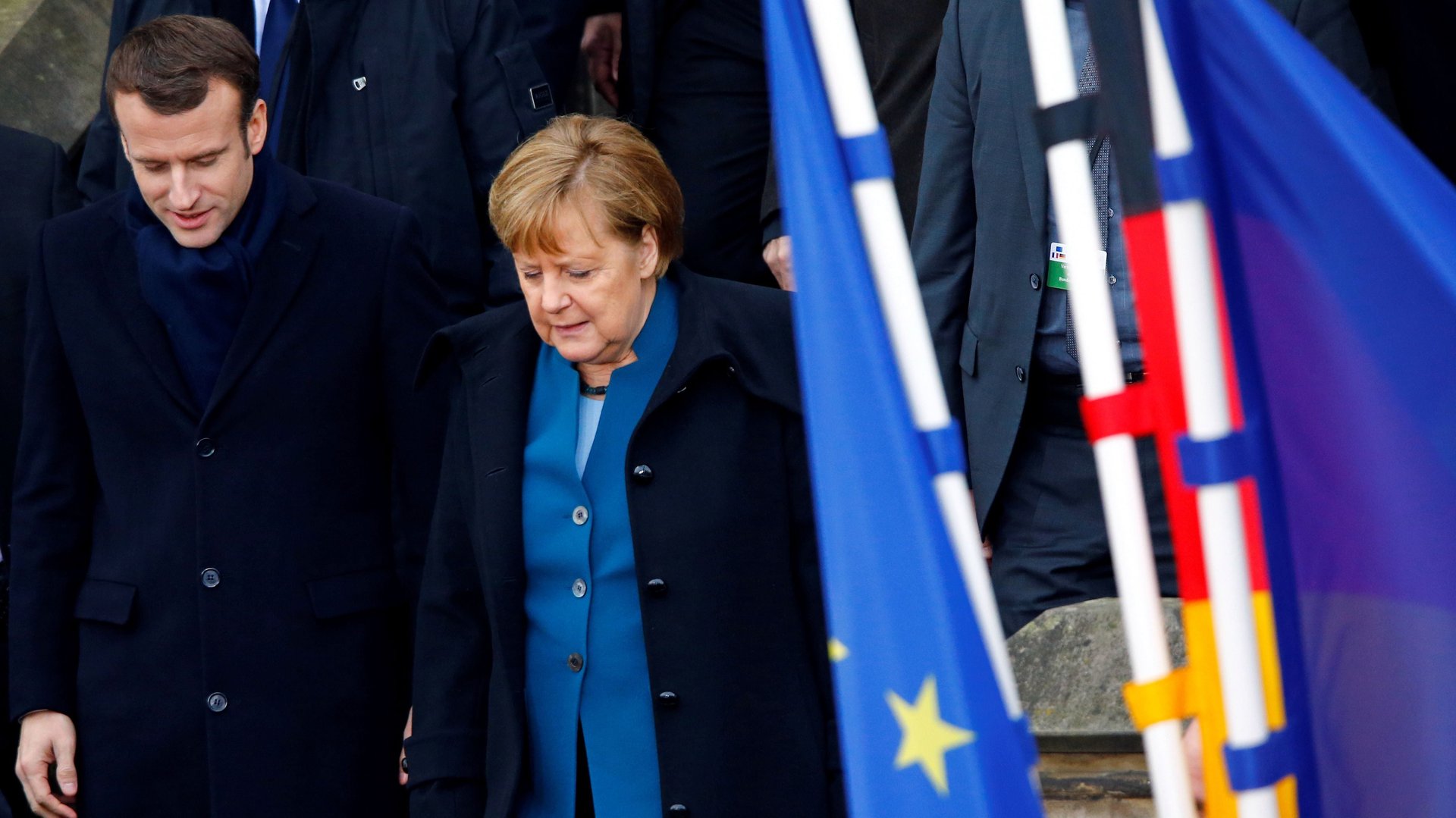The weirdest fake news controversies surrounding the new France-Germany treaty
French president Emmanuel Macron and German chancellor Angela Markel met today (Jan. 22) in Aachen, Germany, to sign a bilateral treaty outlining their two countries’ relationship on matters ranging from defense and diplomacy to culture and commerce.


French president Emmanuel Macron and German chancellor Angela Markel met today (Jan. 22) in Aachen, Germany, to sign a bilateral treaty outlining their two countries’ relationship on matters ranging from defense and diplomacy to culture and commerce.
The aspirations set out in the treaty aren’t new, but serve to reaffirm the Franco-German relationship amid the chaos of Brexit, the rise of far-right parties across Europe, Merkel’s upcoming departure, and this year’s European elections. Still, you wouldn’t know that from how the treaty was portrayed on social media, where false rumors about the agreement rapidly spread, relayed by far-right politicians and conspiracy theorists.
The treaty (link in French) builds upon a 1963 cooperation agreement. In the latest version, the two countries commit to “deepen their cooperation” on issues such as foreign policy and security, and to vote symbiotically at the European Union and United Nations. France promises to advocate for Germany’s entry into the UN Security Council, and both countries promise to strengthen their cultural, economic, and educational ties with each other, the EU, and Africa. It also proposes the creation of a Franco-German “economic zone” to deepen economic ties, and outlines a plan to “jointly invest” in the EU “to fill its capacity gaps.”
The document didn’t contain any groundbreaking policy changes, but that didn’t stop it from spurring “the most hallucinating fantasies” in France, writes Le Figaro newspaper (link in French).
In one notable example, Bernard Monot, a member of the European Parliament and former member of the right-wing populist party National Rally, told his supporters in a since-deleted video that Macron was preparing to sell the French border region of Alsace—which Germany annexed in 1871 and then had to return to France after World War I—back to Germany. In the video, Monot claimed that “Alsace will return under German management, and the administrative language will be German,”—an assertion which France’s public broadcaster called “delirious“ (link in French). The video was viewed and shared by thousands of social media users before it was taken down.
Meanwhile, National Rally leader Marine Le Pen said in a video (link in French) that the treaty would see France share its permanent seat on the UN Security Council with Germany, an untrue statement. She also tweeted that the agreement was a “serious abandonment of [France’s] sovereignty.”
Le Monde also reported (link in French) fake news about the treaty was spreading through “the far-right’s networks of ‘re-information’…and Yellow Vests’ social media groups,” referring to the protest movement which has roiled France in recent weeks. Social media users and some far-right politicians accused Macron (link in French) of deliberately hiding the contents of the treaty, despite the document being publicly available on the government’s website. Nicolas Dupont-Aignan, an MP and president of the Rise Up France party, posted a video on Twitter in which he claimed the treaty was signed “in secret.” Le Pen echoed that statement, saying Macron signed the treaty “on the sly.”
The French government issued a release on Monday (Jan. 21) in which it addressed point-by-point the “scandalous false information circulating on the Franco-German Treaty.” Mainstream media outlets in France were also quick to debunk these myths.
Fake news has been an ongoing concern for France. In November, the French parliament passed a law to combat its spread, both online and through foreign media outlets, in the three months preceding an election.
It’s unclear how effectively these efforts will stem the flow of online disinformation. Its spread, sometimes driven by automated bots, is a growing problem in Europe, touching everything from Catalonia’s independence to the recent UN migration pact.